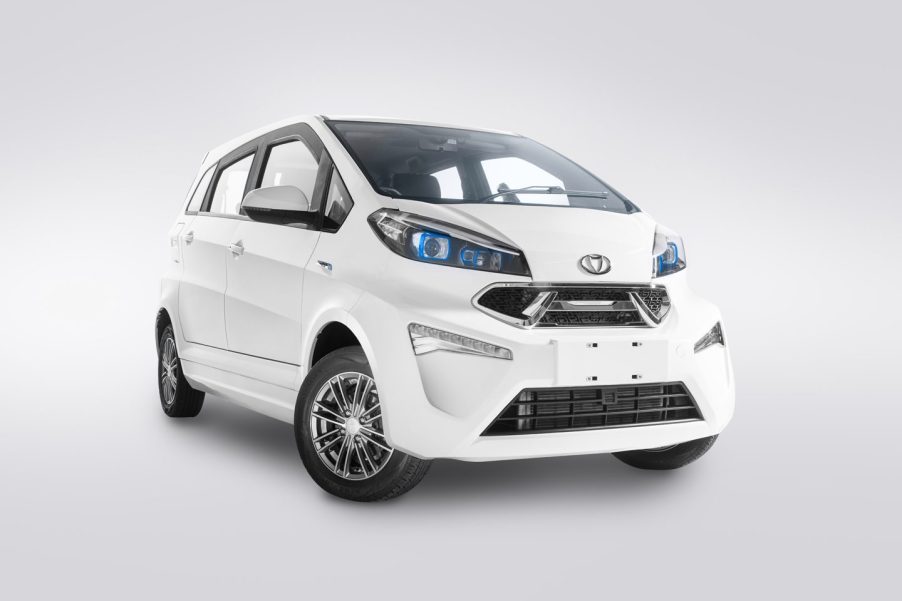
Kandi EV Has Bad Start In US By Allegedly Faking Sales And Fraud Charges
Chinese car manufacturer Kandi Technologies Group has been marketing its EV as the cheapest EV sold in America. It has also been marketing itself as having a lot more sales than it actually has according to financial research firm Hindenburg Research. With this latest Hindenburg news, Kandi EV now has a bad start in the US by faking sales to boost investment.
Hindenburg Research is the short seller that called out EV startup Nikola’s rather flimsy claims. That information and the resulting implosion of Nikola started a chain reaction of bad. Nikola’s valuation has tanked, its CEO quit the company, and just yesterday its deal with GM was cranked back to almost nothing.
Hindenburg alleges over 60% of Kandi’s sales went to companies Kandi actually owns

Now it alleges that over 60% of Kandi’s sales this year have gone to companies that Kandi actually owns. It says that 55% of sales in the last 12 months were to Jinhua Chaoneng Automobile Sales. This company’s phone number is the same as a Kandi subsidiary and employs an executive that also works for Kandi.
The remaining 5% of sales went to Zhejiang Kuke Sports Technology Company which was owned by Kandi. It still displays the Kandi logo on its website. But Kandi just released a statement saying, “Hindenburg Research, as it disclosed, has taken a short position in shares of Kandi. We believe that the report contains numerous errors, misstatements of historical facts, inaccurate conclusions, and superfluous opinions.”
There are other accusations levied by Hindenburg. It alleges 90% of Kandi’s US exports went to only three companies that all have ties to Kandi. Essentially, it says Zhejiang Kuke Sports Technology bought cars and then sold them back to companies with ties to Kandi. In some cases, Kandi sold cars to Kandi founder’s Massimo Motor Sports, who in turn sold them back to Kandi.
Hindenburg alleges Kandi had shady dealings in the past

Shedding numerous company auditors and Chief Financial Officers in the last several years is another bad sign according to Hindenburg. It further states that Kandi has had shady dealings in the past. It relates that the first cars imported into the US were seized by customs for coming here illegally. And those involved in Kandi’s first initial public offering in 2007 were charged with fraud in 2014. The US Securities and Exchange Commission received $1.3 million in a settlement with Kandi last year.
Hindenburg calls out Kandi’s poor quality and how it doesn’t honor warranties. There are accusations by Kandi’s first US importer that Kandi’s Coco EV was so bad that every one of the first batches broke down.
Acts of past questionable sales are outlined in Hindenburg’s findings

Other acts of past questionable sales are outlined in Hindenburg’s findings. It also shows how these bogus sales are directly or indirectly tied back to Kandi. It even goes into how the company was fined and sanctioned by the Chinese government for faking sales to get government subsidies. “Our investigation included extensive on-the-ground inspection at Kandi’s factories and customer locations in China, interviews with over a dozen former employees and business partners, and review of numerous litigation documents and international public records,” Hindenburg reports.
In all, it paints a pretty poor picture of Kandi’s past and present business operations and dealings. But remember that Hindenburg is shorting the company just as it did with Nikola. And in Nikola’s case, everything outlined by Hindenburg has so far turned out to be true. With the litany of accusations levied at both Nikola and Kandi, Hindenburg would be opening themselves up to a number of legal charges were they not vetted.
So, right now all eyes are on Kandi to see how they respond and what the feds might do with this many allegations directed at Kandi. Hey, it’s 2020 so everything is upside down right now.



